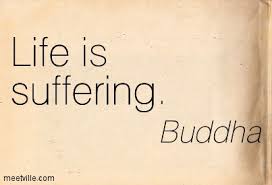 As Randy and I approached the door to the grocery store, a man who appeared to be in his 30s was coming out the door. He cradled a sack of groceries in his left arm and pushed the door with his right hand. He was wearing jeans and a plaid shirt, his hair was a bit disheveled, and by the look on his face, he was in the middle of a tough day. I pulled the handle toward me and held the door open for him. Mid-way through the doorway, he hesitated, looked directly at me and without expression said, “Life’s rough.”
As Randy and I approached the door to the grocery store, a man who appeared to be in his 30s was coming out the door. He cradled a sack of groceries in his left arm and pushed the door with his right hand. He was wearing jeans and a plaid shirt, his hair was a bit disheveled, and by the look on his face, he was in the middle of a tough day. I pulled the handle toward me and held the door open for him. Mid-way through the doorway, he hesitated, looked directly at me and without expression said, “Life’s rough.”
With that simple declaration, he strode into the parking lot and I never saw him again.
Randy and I were best friends. Like most 16 year-olds, we were full of teenage hubris and delusions of indestructability and unlimited potential. This spontaneous confession from a stranger was initially hilarious to the two of us. We laughed about it as we walked through the store. For weeks after that, during awkward moments, silent moments, or for no reason at all, one of us would look at the other, furrow our brow, and say solemnly, “Life’s rough.” We’d laugh the laugh of the clueless.
At 16, my life seemed neatly packaged. I had no significant concerns, and I went about my days with the faith that if I was a dutiful son, a good friend, and an upstanding Christian boy, all would be well. I would be immune to significant suffering. I had a stable family, good friends, I was likeable, talented, and made good enough grades to assure my admission into college. It seemed to be working.
Sure, I had experienced my share of the typical pains of growing up, of mishaps and injuries, friendship squabbles, disappointments, heart-rending break-ups, and teenage angst, but life seemed mostly manageable and all systems were “go” for what seemed more of the same. At the time, I also assumed that by the time I got to my 30s, I’d have things figured out and that life would take on a predictability and stability that I saw in the adults around me, most of whom seemed pretty happy with how their lives were going.
However, those two words from the stranger in a plaid shirt caught me off-guard. They came in such a surprising and unlikely way, and they came from someone who appeared to be at that “stable” time in his life. As often as Randy and I laughed about that moment in the months that followed, the words remained, gnawing at some naïve assumptions I had about my life and my future.
The first noble truth of Buddhism is “Life is suffering.” The very nature of human existence is that it includes pain, disappointment, loss, suffering. I had read no Buddhist literature at that time, and I had no idea about the noble truths, but this Buddha in a plaid shirt flipped a switch in my mind, and life circumstances soon began to follow.
Lent is all about recognizing the inevitability of suffering and loss. But with that recognition comes a strength and perspective not available for those who continue to deny and avoid the suffering. More about that in the coming days.
0 Comments until now
Add your Comment!